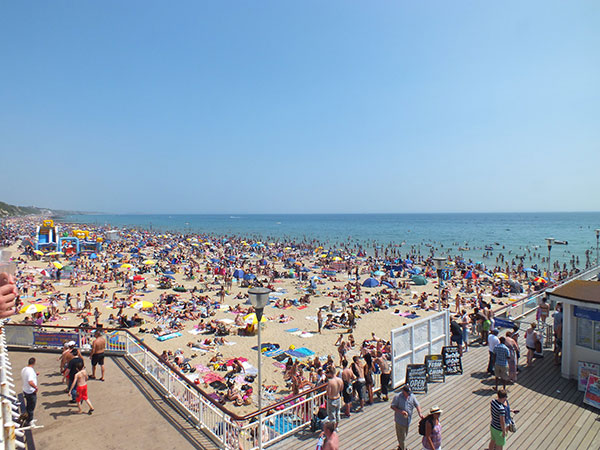Of all the TV genres, weather reports are the most disposable. With the exception of weatherman Michael Fish telling the nation not to worry about rumours of a storm in 1987, weather forecasts are almost never replayed.
But the forecasts from recent summers should not be forgotten. Heat records have fallen like those 1987 trees. June 2020 was the hottest ever recorded. The August bank holiday 2019 was the UK’s hottest on record; made up to 100 times more likely because of human-caused climate change.
Almost always these incredible temperatures are transmitted by weather people on screen with a what-a-scorcher wide smile. Occasionally they offer some advice like ‘stay in the shade’ or ‘don’t’ forget the sunscreen!’. Good advice, but not the CHANGE EVERYTHING, ACT NOW catastrophe aversion response needed.
Elsewhere, newspapers often tell the story of the devastating effects of heatwaves but fail to match the pictures – those tend to show people having fun in the sun, rather than suffering the effects of a heatwave. So what is our plan in the media for describing the danger more accurately? Because surely to perpetuate a collective delusion – even if we’re all in on the joke – is going to wear thin.
It will also mean that we miss an opportunity: to get to mass audiences and to explain why net zero is achievable and desirable. Too many people are currently excluded from the climate change debate and that is partly because it has not been given enough airplay.

Along with the natural history film maker, Tom Mustill, I founded and present a podcast, So Hot Right Now, which is simply about communicating nature and science more effectively. Because the best way of avoiding extreme heat, extreme weather, food shortages, mass displacement, war and disruption to our lives is to concentrate on keeping emissions well below two degrees. Describing this, and what our future will look like when we achieve this aim, well that is the job.
But substantive, big-picture stories of accelerated climate change during the pandemic are still Missing In Action.
‘Albert’ is a BAFTA-led programme of change that leads the screen industry authority on environmental sustainability, which also monitors climate coverage on TV. Important, because research tells us this is where most get their climate information from. Although coverage is expected to have increased slightly, it still falls way below what is needed. In 2019 ‘climate’ was covered across TV networks twice as many times as the subject of ‘rhubarb’ but far less than ‘aliens’.
So what needs to be covered on TV and how would it look? It’s not just straightforward climate science, but everything we need to avoid climate collapse. This means whenever food, homes, travel and consumer products are shown on screen – their environmental context should be made clear. One way we will not achieve progress is by pretending that this planetary crisis doesn’t exist.
This brings me to Inside Missguided: Made in Manchester, a ‘documentary’ that made light of the impact of a fast fashion brand, and its system of over production and over consumption. For me this is an example of TV being on the wrong side of the moment, possibly in its attempt to appeal to a youth audience. This is mistaken. It’s hard to think of a generation at any time in history that understood planetary pressures as much as this one.
TV networks must respect that and not brush them off with content that is delusional. These days, Disney is the world’s fastest growing on-demand TV channel. Let’s not leave all our environmental messaging to Elsa and the others from Frozen.
This column originally appeared in the autumn print issue of Wicked Leeks magazine. You can read the full magazine for free on Issuu.












As a state of the nation observation, the lack of reports on our changing climate is depressing.
The problem is though that the majority of outlets want to keep their audience, and the simple fact is that “banging on about climate change” will cause audience numbers to fall.
This is a human problem, a psychological problem. Not just a media problem.
I have often thought that we are not reaching the right people in the media, only those who are interested in climate change and the environment. In order to reach the rest of the population it needs to be covered within a more ‘normal’ context for them. These contexts could be for it to be included in the ‘Soaps’ ie East Enders, Coronation Street etc where it could just be included in normal conversation, thereby drip feeding the nation so that it does become a subject for them to discuss and think about and also give them the knowledge.
Well said. Though there seems to have been a step change in mainstream media coverage of the Climate Crisis over the past couple of years, due in significant part to the Climate Strike movement of Greta Thunberg and the civil disobedience of Extinction Rebellion. Even so, media coverage remains woefully inadequate.
TV weather broadcasts are an ideal opportunity to place both recent and predicted weather events in the context of the changing climate. Now that the science of climate attribution is routinely employed by atmospheric scientists to quantify the extent to which human GHG emissions have increased the likelihood and severity of extreme weather, the continued reticence of the broadcast media is bewildering – a form of denial perhaps driven by the fear of appearing unduly alarmist.